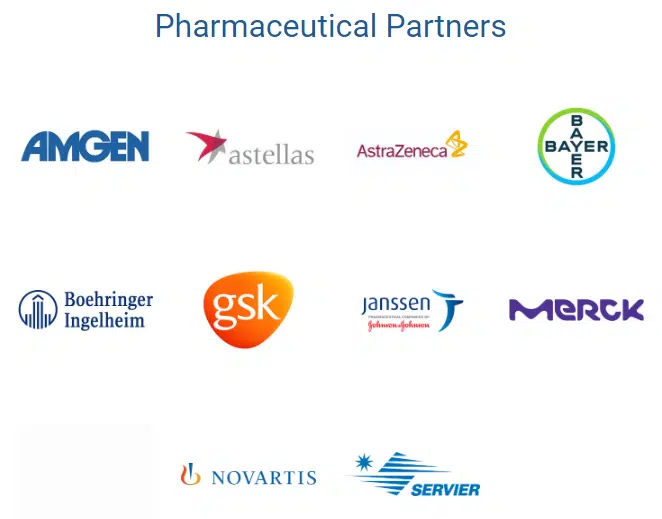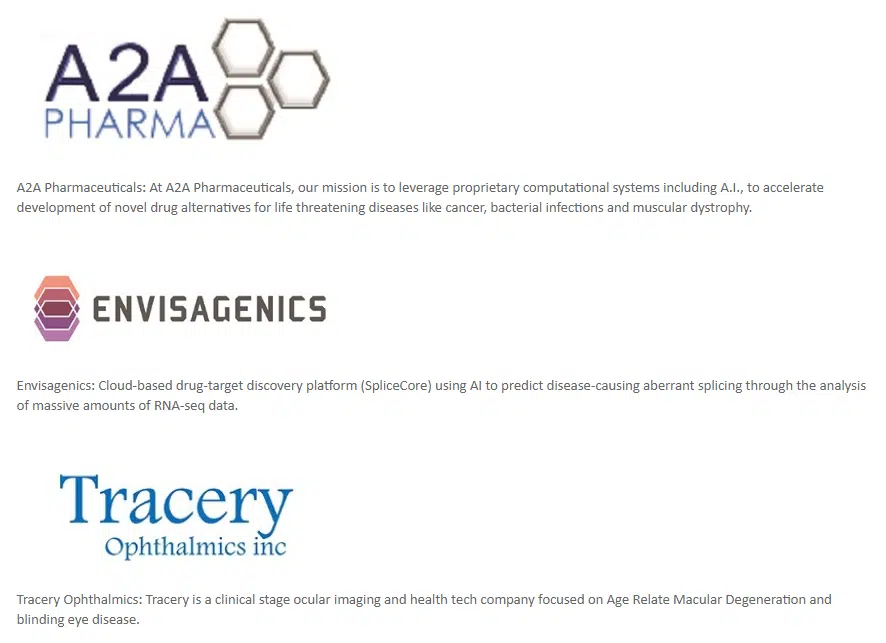
We see evidence dating back to 2017 that Johnson & Johnson has been regularly publishing about their investments and initiatives related to artificial intelligence. At present, Johnson & Johnson does not seem to boast any mature, deployed applications with the firm itself, but its AI-related investment initiatives indicate their aspirations.
According to an analysis by FiercePharma, Johnson & Johnson (J&J) is the largest pharmaceutical firm by revenue, bringing in $82.1 billion in 2019. It’s a global healthcare behemoth with significant investments in life sciences spanning pharmaceuticals, consumer healthcare, and medical devices. However, its pharma group has seen the lions’ share of J&J’s success, outperforming its other units with notable sales expansion in oncology and immunology.
J&J claims to be investing in data science competency throughout the firm. Piyush Mathur – Global Head of Workforce Analytics, Data Strategy, and Governance at Johnson & Johnson – summarized these efforts in a 2020 interview with i4cp:
Across the enterprise, data science is one area we’ve been focusing on—it impacts every single function. We’ve started an overarching initiative across J&J called the Data Science Council. There are fifteen of us on the council made up of members from supply chain, R&D, finance, HR and the commercial side, all thinking about how to develop this skill within each function.
In this article, we’re going to take a look at the known AI-related investments of Johnson & Johnson in the two areas where they seem to be most active today.
- Drug Development – J&J’s involvement with the Melloddy life science consortium, and their Quickfire emerging tech startup challenge.
- Robotic Surgery – New services and platforms for automating surgery procedures, which may increasingly be powered by and integrated with artificial intelligence.
Drug Development Investments
We found 2 examples of Johnson & Johnson’s AI-related investments supporting drug development:
Melloddy
The Melloddy project — which stands for Machine Learning Ledger Orchestration for Drug Discovery — is the first initiative we’ve seen that connects data from the world’s largest pharmaceutical companies to support drug discovery.
Johnson & Johnson is one of 10 pharmaceutical firms forming the research consortium. Each contributed €10m of “in-kind” assets to fund the program.

Melloddy aims to leverage the world’s largest collection of small molecules with known biochemical or cellular activity to enable more accurate predictive models and increase efficiencies in drug discovery. The group claims to use “federated learning”, a decentralized type of machine learning, to allow partners in the program to enhance predictive machine learning models on decentralized data from each contributor, without exposing their own proprietary information.
JLABS Quickfire Challenge
Johnson & Johnson’s innovation laboratories (JLABS) is vetting new technologies with a series of what it is calling Quickfire Challenges.
According to a recent JLABS press release, the purpose of the Quickfire Challenges is to overcome the adoption and regulation challenges of applying AI, VR/AR, blockchain, and other emerging technologies in healthcare. The program claims to offer access to mentors and experienced health tech innovators to help companies develop solutions ideas.
The JLABS site lists 44 Quickfire Challenges, which award winners with grant funding from ~$10,000-$400,000 and can also include mentorship or residency at JLABS.
Only one of these events was titled with a specific focus in AI, the 2017 Artificial Intelligence for Drug Discovery QuickFire Challenge. Three winners were awarded:

Envisagenics highlights the details of its winning Quickfire Challenge entry here:
More recent challenges hosted at global innovation hubs like Boston and Seoul have also given AI top billing among the events’ focus areas. That said, we only found one AI-driven solution among Quickfire Challenge winners since 2019.
ImagoWorks, one of two awarded winners of the Seoul Quickfire Challenge, received approximately US$134,000, one year of residency at the Seoul Bio Hub, and one year of mentorship and coaching from JLABS science, technology and commercialization experts.
This Seoul-based company aims to improve surgical outcomes by purportedly applying AI and geometrical modeling technology with its 3D medical/dental software platform. The firm remains in the early stages of development. We found the ImagoWorks CEO’s profile on Linkedin, but no company profile, no employees, no website, and no product demos.
Robotic Surgery Investments
Johnson & Johnson is still in the early stages of developing surgical robotics capabilities that may see widespread use in production. However, its late-2019 acquisition of multiple surgical robotics companies demonstrates a healthy and growing appetite to capitalize on a new paradigm of “digital surgery”.
Verb Surgical
On Dec 20, 2019, Verb Surgical was acquired by Johnson and Johnson for an undisclosed amount. According to information provided on Verb Surgical’s site, it was founded in 2015 as a joint venture between Google and Johnson & Johnson, with the stated goal of providing new tools for surgeons that will empower improved outcomes, taking them beyond conventional laparoscopy and robotics. Since then, it has received a broad mandate and millions in funding to “democratize surgery.”
The company’s stated vision is to create a single, connected platform to replace often-complicated integrations of single-point solutions that don’t provide intelligence. Verb is proposing a new paradigm called “digital surgery”, which is about translating technology and information into actions that have the potential to improve clinical outcomes. If successful, the platform would enable surgeons to prepare for, perform, and follow up on surgery cases in one place, significantly leveling up the amount of actionable information at hand for surgeons. This may include capabilities for sharing procedure data, best practices, and patient data.
We found ample evidence of Verb’s grand ambitions as well as strong funding and support for its research. But so far no demos and few details about the specific service functions under development have been published.
Per IPqwery, the intellectual property of Verb Surgical includes 61 registered patents primarily in the ‘Medical Or Veterinary Science; Hygiene’ category.
Also, in Verb’s most recent press highlight, Ashley McEvoy – EVP and worldwide chairman of Johnson & Johnson’s medical device segment – stated that “both the Auris-I platform and Verb – have conducted end-to-end procedures in multiple different indications in general surgery. We’ve gotten very good feedback from over 30 plus surgeons and we’re going to take the absolute best of all of those as we, in parallel, advance both of those programs.” She also stated that J&J is engaged in active discussions with regulatory bodies in the United States and Europe to advance these technologies.
As of today, we found exactly one job opening for a deep learning engineer at Verb Surgical, as well as tens of other research engineering and data science roles among its 399 employee profiles and 21 job listings on Linkedin.
If Verb’s vision for digital surgery comes to fruition, its platform could create new space for AI-driven solutions. For example, brand new data-sets could be used to train machine learning systems to improve healthcare outcomes. Also, robotic surgery devices could also be made more adaptable by implementing learning systems to facilitate control of the robotic components themselves.
Auris Health
Auris Health – also mentioned in McEnvoy’s statement above – received $733.3M in funding before it was acquired by Johnson & Johnson on Feb 13, 2019, for $3.4 billion. The Silicon Valley company was founded in 2017 by Dr. Fred Moll, co-founder of Intuitive Surgical (NASDAQ:ISRG). Auris received FDA clearance this year for a teleoperated robotic endoscopy system to diagnose lung disease called ARES (Auris Robotic Endoscopy System).
Auris states: The company’s aim is to “diagnose and treat lung cancer in a single setting”. Its “Monarch Platform improves upon existing, minimally invasive techniques by integrating robotics, micro-instrumentation, endoscope design, sensing, and data science into one platform to enable new categories of care.”
We found no explicit examples of exactly how Auris is leveraging AI, but – like Verb – we found many full-time data science and machine learning roles among its 556 listed employees on Linkedin.
In Summary
Johnson & Johnson is in the early stages of a long-term plan for integrating AI with its enterprise. Its recent pattern of investment and acquisitions, as well as its stated goals, hint at a data-driven future for J&J’s drug discovery and robotic surgery businesses, which may prove fertile ground for future growth and integration of AI technologies and services.







